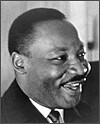Most people also knew the march made specific demands upon government, including: a law prohibiting racial discrimination in employment; protection of civil rights workers from police brutality; a $2 minimum wage for all workers; and self-government for the District of Columbia, then governed by congressional committee. His speech, considered one of the greatest addresses in American history, and the outcome of that march, led to King being becoming the youngest man to be awarded the Nobel Peace Prize (for his work as a peacemaker, promoting nonviolence and equal treatment for different races) in 1964.
A lot can be learned from King, a man who was more interested in promoting civil rights as opposed to censoring those whose aim was to deprive them of those rights. A lot can be learned from the people who followed him to the foot of the Lincoln Memorial, because they understood why they were marching.
Certainly not in every case, today’s activism seems to have changed, and not always for the better. Nowadays, some activists use “we just want to make a point and be heard” as a shield for alternative agendas that their marchers might not understand or agree with.
Addressing “blog swarms” specifically, an activist’s message might be carried forward on thousands of blogs before anyone has gathered the facts. Indeed, the mere volume of posts may make it appear as if the protagonists are telling the truth, even when they are not.
There are many reasons “blog swarms” catch fire, ranging from those who are curious to see why a certain search term has suddenly been driven to the top to those who simply repost an inaccurate recap in order to stack their stat numbers. Even for those who understand a portion of the topic they write about, sometimes the best intentions often bring out the worst behaviors.
Indeed, for these reasons, the phenomenon is probably the most misunderstood and least written about in crisis communication and public relations today. As my class, which usually consists of 15 to 20 students and working public relations professionals, begins this Thursday, it will certainly make for a worthwhile point of conversation in how to apply new and traditional crisis communication strategies to what has possibly become the greatest communicaton threat to businesses today.
Happy birthday, Martin Luther King, Jr. I, for one, miss your message that a true common man could become a civil rights leader, without the benefit of the Internet or anonymity, and move a nation with a noble message that all people, not just some people, could be equal and have a voice.














4 comments:
Was King a true common man? That depends on the defintion. He was was trained to be leader, looked great and spoke well.
What interests me most about this topic is that even though everyone knew, as you said, what he stood for, his full influence was short lived. When he died in '68, there were riots "in his honour".
And James Brown, who recently died was famously put on TV to help keep people out of the streets. This is the kind of opposition movement that King didn't want.
Thanks for the comment. I appreciate it.
The riots, in part, were the immediate emotional response to the loss of King at a time when he was seen as making tremendous progress. For many people — regardless of race, color, or creed — he was a solution to many social problems and then, suddenly, it was all swept away, leaving a void where hope had been.
The other part, perhaps, was another civil rights leader (along with others), who had rejected the idea of compromise, finding opportunity in King's death. That leader was Malcolm X, who preferred revolution as opposed to integration.
Of course, that is but a thumbnail of an answer. Suffice to say that King would not have supported riots to honor him, which is why James Brown performed, hoping to shift emotional anger into national mourning.
As far as common man, I suppose it does depend on the definition. For me, I don't draw distinctions between doctors and dishwashers. They are all common men with an equal potential for greatness.
While King was educated, and perhaps trained to be a leader in some respects, I don't believe he was trained to be the leader he became. Sure, some might think the difference is subtle, perhaps as subtle as being fearless or courageous, despite the fact that the terms are miles apart.
Good post.
Donnica,
Thank you.
Rich
Post a Comment